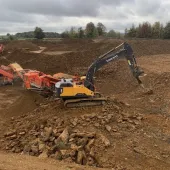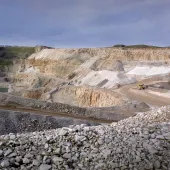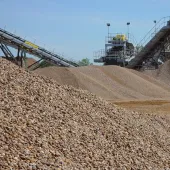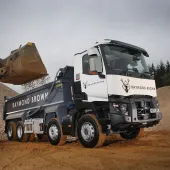Dean Quarry could boost Cornish economy

New economic impact report says re-opening of coastal quarry could generate up to £190 million for Cornwall
THE re-opening of Dean Quarry near St Keverne on the Lizard Peninsula could generate between £140 million and £190 million for the Cornish economy, according to an economic impact report published this week.
The coastal quarry, which has been dormant since 2008 but has an existing consent to operate until 2035, was acquired by Shire Oak Quarries last year in the hope of re-opening the site to supply up to 5 million tonnes of rock armour to the proposed tidal lagoon renewable energy project in Swansea Bay.
Shire Oak Quarries commissioned the study to look at how the potential spending and employment involved could impact on the Cornish economy. Although the commercial and operational plans for the site are still being established, the report provides a snap-shot of the potential economic opportunity it offers.
Prepared by Kevin Butler, consultant economist with South West-based chartered accountants Milsted Langdon, the report concludes that there could be a net positive impact from the quarry’s operations of up to £190 million over the next 20 years (assuming an inflation rate of around 2%) or £160 million in today’s money values. This includes an annual labour bill of £3 million as well as £5 million spent every year on goods and services, with a commitment to source as locally as possible.
The quarry could create up to 50 year-round direct and contractor jobs, including skilled and managerial positions, and create or safeguard a further 100 in the local economy. It could also generate an estimated £50 million for the Exchequer through the Aggregates Levy.
Mr Butler said: ‘Dean Quarry is an important economic asset for Cornwall and has the potential to bring substantial economic benefits to the immediate locality and to the wider region. It would create new, well-paid, non-seasonal jobs and the intention is that the majority of its operating budget would be spent locally, ideally within a 25-mile radius of the quarry. This would create a net positive impact valued at millions of pounds a year.’
Kurt Larson, managing director of Shire Oak Quarries, said: ‘Extractive industries remain a major part of Cornwall’s economy and Dean Quarry was worked for around 100 years before it was mothballed in 2008. This report shows the potential for the quarry to continue to make an important contribution to local employment and the economy.’
Shire Oak Quarries are hoping to supply rock armour to the proposed tidal lagoon renewable energy project in Swansea Bay because the dense gabbro rock found at Dean Quarry is ideal for tidal defences. However, any decision to use rock from the quarry rests with CHEC (China Harbour Engineering Company Ltd), who have been commissioned to build the £300 million tidal lagoon wall and are responsible for sourcing and transporting the materials required.
CHEC are said to be assessing the resource and transport options at Dean Quarry as part of a wider study of UK and European rock supply, but have yet to make a decision.
If chosen to play a role, Shire Oak Quarries intend to export rock from Dean Quarry by sea and are continuing to examine the options for the necessary marine transport infrastructure. The intention is to construct two new jetties protected by a breakwater, from which around two or three barges would leave the quarry each week for a period of 32 months.
Proposals to re-open the quarry have met with opposition from local action group CADS (Cornwall Against Dean Superquarry), which is concerned about the potential effects on both tourism in the area and the Manacles Marine Conservation Zone.
To help address such concerns, earlier this year Shire Oak Quarries appointed Jonathan Kearsley as director for stakeholder relations. Hailing from nearby Coverack, he has a background in renewable energy and sustainable development in Cornwall.
Speaking at the time of his appointment, Mr Kearsley said: ‘The quarry has been dormant for several years, so it’s understandable that people have questions about how it will operate and whether it will impact on them. We want to be a good neighbour and my role is to help ensure that happens now and in the future.’









